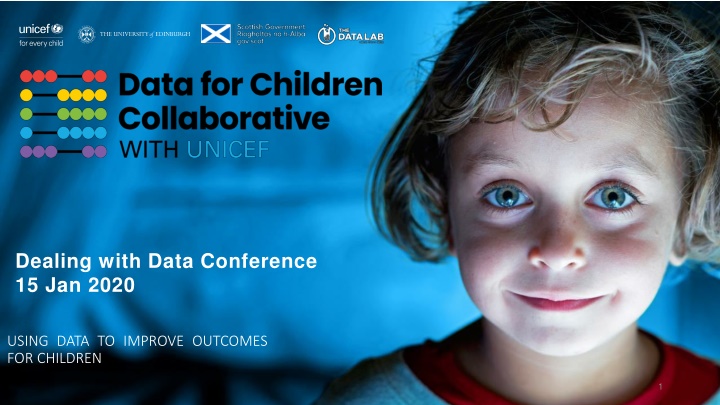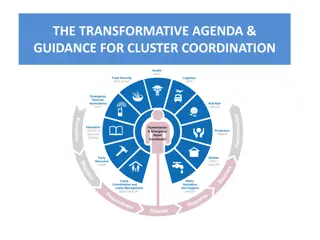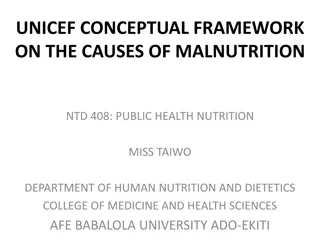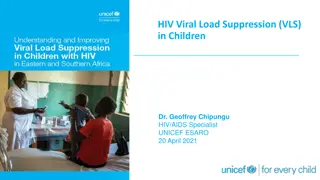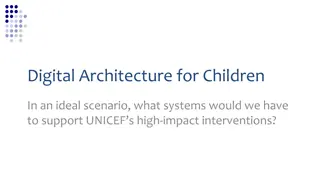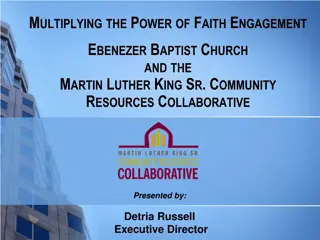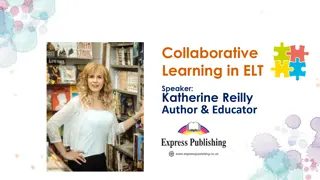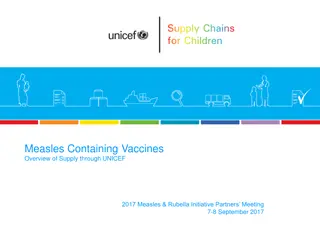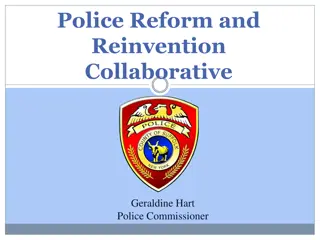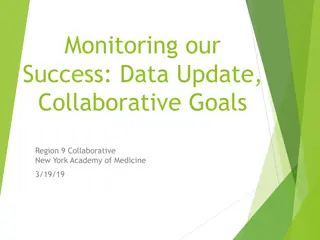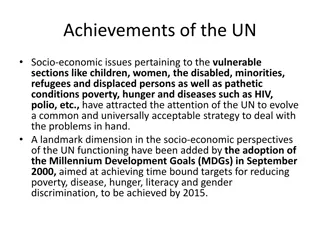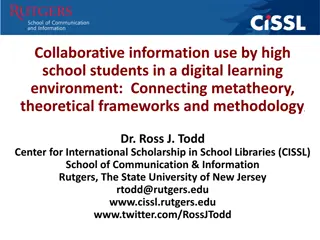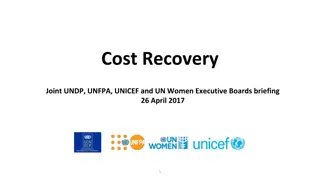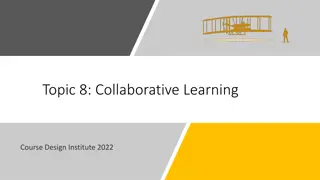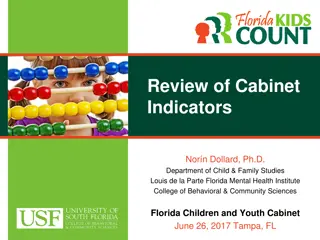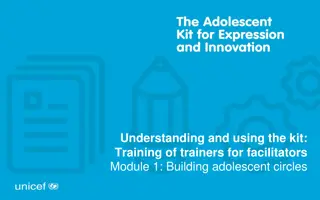Data for Children Collaborative with UNICEF: Opportunities and Challenges
The Data for Children Collaborative with UNICEF aims to enhance outcomes for children by leveraging data and data science. This unique partnership between UNICEF, the University of Edinburgh, and the Scottish Government tackles childhood issues at local, national, and global levels. Through innovative data projects, the Collaborative seeks actionable insights to drive policy and practice improvements while navigating ethical considerations and child safeguarding. Challenges include data selection, access, and collaboration across diverse organizations.
Download Presentation

Please find below an Image/Link to download the presentation.
The content on the website is provided AS IS for your information and personal use only. It may not be sold, licensed, or shared on other websites without obtaining consent from the author.If you encounter any issues during the download, it is possible that the publisher has removed the file from their server.
You are allowed to download the files provided on this website for personal or commercial use, subject to the condition that they are used lawfully. All files are the property of their respective owners.
The content on the website is provided AS IS for your information and personal use only. It may not be sold, licensed, or shared on other websites without obtaining consent from the author.
E N D
Presentation Transcript
Dealing with Data Conference 15 Jan 2020 USING DATA TO IMPROVE OUTCOMES FOR CHILDREN 1
Dealing with Data Conference Dealing with Data Conference Title: The Data for Children Collaborative with UNICEF The Data Opportunities & Challenges when Collaborating across Organisations Abstract: This new partnership between UNICEF, the University of Edinburgh and the Scottish Government presents some unique opportunities and challenges for a variety of reasons. This talk will take you through the story so far in building up this cross sectoral partnership which looks to deliver impact and insight to childhood issues, locally, nationally and globally, through the use of innovative data and data science. Understand more about project selection processes, governance frameworks, ethics and child safeguarding, all whilst highlighting the need for extra caution when working with data relating to children. 2
Agenda # Item Introduction 1 Project Initiation Processes 1 Governance Frameworks 2 Ethics & Child Safeguarding 3 Summary 4 3
1.1 Data for Children Collaborative with UNICEF 1.1 Data for Children Collaborative with UNICEF - - Introduction Introduction Using data to improve outcomes for children. The Data for Children Collaborative with UNICEF is a joint partnership between UNICEF, The Scottish Government and the University of Edinburgh. The Collaborative seeks to improve outcomes for children locally, nationally and globally.It draws on the strengths of all partners to bring insight and solve problemsusing data and data science. The Collaborative prioritises and enables data projects linking academics, UNICEF subject matter experts and Scottish Government childhood policy and analyst experts, whilst also fostering partnerships with other organisations. These projects will have a focus on adoption of actionable insights to inform policy and practice. The Collaborative is funded jointly by the Scottish Government, through the Scottish Funding Council, and the University of Edinburgh for a start- up period of three years. Increased availability and use of data has highlighted innovative new techniques to solve real-world problems across all sectors. The Collaborative believes that the capabilities and capacity of the partners and wider partnerships can be leveraged to tackle key problems across some of the world s fundamental childhood issues. The challenge for the Collaborative is finding the right data for the right problem and gaining access to use it in the right way. With the right support from all partnersand other stakeholders, we feel that this is a challenge that can be met, learntfrom and shared with others. 4
1.2 Challenges when Collaborating across Organisations 1.2 Challenges when Collaborating across Organisations Three large organisations,each with its own set of policies,governance, ways of working Dealing with sensitive data relating to children Global reach of projects, with different data legislationsimpactingeach project Cross-organisationalprojectteams Partneringwith external organisations,e.g. private sector,adds a layer of complexity 5
1.3 Data for Children Collaborative 1.3 Data for Children Collaborative How we work How we work Impactful Trusted The Collaborative will create an Ethical Charter that will outline the responsibilities and practices of any activity relating to the Collaborative, as well as support decision making. The Collaborative will ensure all projects adhere to an ethical protocol throughout the project lifecycle. The Collaborative will comply with all legal and regulatory requirements relating to data protection including privacy, security and usage. Projects propositions will be generated through discussion and consensus from all three partner organisations: UNICEF, the Scottish Government & the University of Edinburgh. Problem statements will be clear and project outputs / insights / actions will be defined from the outset. The child will be at the heart of all decision making regarding project impacts. Agile The Collaborative will operate in a highly flexible and interactive manner across the collaborators and with other delivery partners. The Collaborative will respond to change quickly and work to move constraints as projects progress. Innovative The Collaborative will deliver projects that involve data driven innovation. These projects can be innovative either in; the data science methodologies used; the data set being used; or new data linkages. Safe Transparent The Collaborative will prioritise the safeguarding of children above all else. All key stakeholders and project resource will undergo UNICEF approved safeguarding training. The Collaborative will embed a Youth Engagement assessment into its core operating model. Each project proposal will go through a prioritisation framework to assess its suitability, deliverability, impact and scalability before progressing to our Advisory Board and Governance Board for approval to proceed.
2.1 Prioritisation Framework 2.1 Prioritisation Framework Alignment to Collaborative vision Principal actor / sponsor Actionable insights Return on investment Prioritisation Assessment Total Suitability Score /3 Subjective scoring of agreed project proposal on 0 3 scale against the following criteria: Timescale v s Return Data Accessibility Data Usage Data Ethics Challenges Total Deliverability Score /3 (with x 1.2 weighting) SDG alignment NPF alignment Innovative Delivers leverage 0 Reject 1 Poor 2 Good 3 Excellent Total Impact Score /3 (with x 1.2 weighting) Financial Resources / Funding Human Resources Scalability Score /3 Total possible score of 16.2 points Geographic Impact Diversity Success Measures Definition Portfolio /3
2.2 Project Initiation Document 2.2 Project Initiation Document The Project Initiation Document considers the follow headings e. f. g. Reporting Responsibilities Tools 9.Project Plan a. Dependencies b. Tolerances c. Planning assumptions d. Deliverable plan e. Schedule f. Resource plan g. Data Access & Usage plan h. Financial budget i. Measurements plan j. Project completion 1.Project Definition a. Background to the Project b. Objectives of the Project c. Economic Impact of the Project d. Project scope and exclusions e. Constraints, assumptions and issues f. The sponsor / actor and other known interested parties g. Data sources h. Project Approach 6.Data Science a. Purpose b. Methodology c. Ethical considerations d. Records e. Reporting f. Responsibilities g. Tools 7.Risk Management a. Purpose b. Processes, standards and definitions c. Tools and techniques d. Timing of risk management activities e. Risk appetite and tolerance f. Reporting and indicators g. Escalation h. Reviews and assessments 10.Intellectual Property a. Background b. Title to Project Intellectual Property c. Licensing d. Ownership of Technical Data e. Dispute Resolution 2.Roles & Responsibilities a. Key stakeholders and subject matter experts b. Project Team 3.Business Case 4.Organisation and Structure a. Team / Virtual Team Structure b. Governance Model c. Roles 11. Publication a. Approval Process b. Funding Terms 8.Communications Strategy a. Purpose b. Communication procedure c. Definition of stakeholders d. Stakeholder analysis e. Information needs for each interested party f. Review and feedback 11. Project Controls a. Safeguarding Training b. Ethical Review c. Ethical Checkpoints d. GDPR Review 5.Data Strategy a. Purpose b. Data sourcing methodology c. Ethical considerations d. Records 8
3.1 Board Governance Structure Proposal 3.1 Board Governance Structure Proposal University of Edinburgh EFI via DDI Governance UNICEF Scottish Government via SFC Governance Collaborators and Funders Membership Chair Stefaan Verhulst GovLab UoE Gillean McCluskey Scottish Acad Lead UoE Lesley McAra EFI Public Sector Mahmood Adil Clinical & Pub Health Public Sector Mick Wilson Scot Gov UNICEF Mark Hereward UNICEF UNICEF Lucinda Rivers- UNICEF Independent Manolo Perez TDL Independent Richard Kenway (Interim) Ethics Independent XXX International Childhood Expert Delivery Alex Hutchison Del Director (Quarterly) Steering Board Strategy Set jointly agreed direction AI-X (University of Edinburgh) Membership Alex Hutchison Del Director (Chair) Carol Sinclair NSS Gillean McCluskey Scottish Acad Lead Kostas Kavoussanakis EPCC Lucinda Rivers UNICEF XXX UoE Ethics Rep Review expertise available for ethical guidance Delivery Director Delivery Support Albert King Scot Gov XXX UNICEF Ethics Rep Jude McCorry TDL Liz Reilly Philanthropy Ritchie Somerville DDI Board Practice Support, enable, and empower Direct for impact (Fortnightly) (Fortnightly) (Fortnightly) Delivery Implement for impact Project Working Group A Project Working Group C Project Working Group B Future projects Future projects Future projects Future projects Future projects Data Holders (Periodically) Reflection Advise Partnership Forums Reflect and Inform Other Stakeholders Decide Deliver 9 Youth Engagement
4.1 Safe Data Ecosystem 4.1 Safe Data Ecosystem Ethical Assessment: Compass Roadmap Highway Code Socio Ethical Questions PID incorporates Data Management Plan, based on UoE templates Data Data UoE online Data Protection Impact Assessment Protection Management 10
4.2 Ethical Assessment 4.2 Ethical Assessment Roadmap Highway Code On The Road Destination Start (periodic review) (at results stage) (at outset) Detailed guidance notes to support completion of Roadmap Project Project Project Data Data Data Results Results Results 11
4.3 Safeguarding Training 4.3 Safeguarding Training Developing Safeguarding Training in three tiers to meet training requirements: L1 Theory Test low risk safeguarding statement + 15-minute review L2 Driving Test medium risk safeguarding statement + 45-minute training session L3 Advanced Driving Course high risk full UNICEF safeguarding training 12
5. Summary 5. Summary Three large organisations, each with its own set of policies, governance, ways of working Leverage the strengths of each organisation Be transparent on which policies will be used to manage data Make sure all decisions are clearly agreed at the appropriate governance forum Dealing with sensitive data relating to children Build a clear framework of project initiation for each project to adhere to Engage relevant experts in review of any assessments / project documentation Global reach of projects, with different data legislations impacting each project Seek local expertise for different requirements Cross-organisational project teams & external organisations Build trust via clear ways of working and expectations on stakeholders Communicate code of conduct to all involved in project and appropriate level of safeguarding training 13
